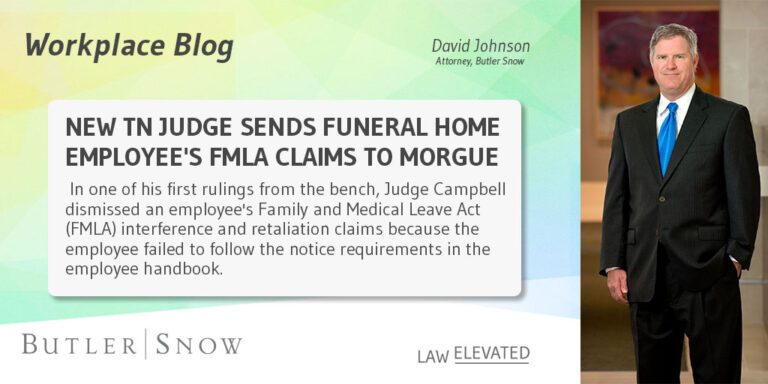This article was first published on HRLaws.com’s Tennessee Employment Law Letter by Butler Snow’s David L. Johnson.
We have a new federal judge here in Middle Tennessee named William (Chip) Campbell. In one of his first rulings from the bench, Judge Campbell dismissed an employee’s Family and Medical Leave Act (FMLA) interference and retaliation claims because the employee failed to follow the notice requirements in the employee handbook. Let’s take a look.
Facts
Ommer Everson served as general manager of a funeral home in Goodlettsville owned by SCI Tennessee Funeral Services. Everson suffers from Ménière’s disease—an inner ear disorder—and was allowed to take off work in 2010 and 2014 to undergo treatment procedures. In January 2015, he asked his supervisor for permission to take a week off work later that month to undergo a third procedure. His supervisor responded: “That’s fine, whatever time you need.”
Two days after that conversation, SCI fired Everson. The company stated that it fired him for failing to refrigerate an unembalmed body. Everson decided that he would accept the termination over his own dead body and sued SCI.
Claiming he was really fired for requesting the leave, Everson brought interference and retaliation claims under the FMLA as well as discrimination, failure to accommodate, and retaliation claims under the Americans with Disabilities Act (ADA).
Court’s holding
Judge Campbell dismissed Everson’s FMLA claims on summary judgment (i.e., without a trial). To prove an FMLA interference claim, an employee must show that he notified his employer of his intent to take FMLA leave and the employer denied him the leave benefits to which he was entitled. SCI argued that Everson never invoked any rights under the FMLA because he didn’t comply with its policy for requesting FMLA leave. In particular, SCI’s employee handbook states that an employee must contact the company’s Leave and Disability Center.
Everson acknowledged that he didn’t follow the policy and never mentioned the FMLA by name during his discussions with his supervisor. However, he argued that his conversation with his supervisor about his need to take leave for his Ménière’s disease was sufficient to place SCI on notice that he was invoking FMLA protection.
Judge Campbell found that Everson’s argument would have had merit before the FMLA regulations were changed in 2009 to “explicitly [permit] employers to condition FMLA-protected leave upon an employee’s compliance with the employer’s usual notice and procedural requirements, absent unusual circumstances.” Because Everson didn’t identify any unusual circumstances to justify his noncompliance with SCI’s notice requirements, the employer couldn’t have interfered with his FMLA rights. For similar reasons, the court dismissed his FMLA retaliation claims, finding SCI couldn’t have retaliated against him for invoking rights under the FMLA because he never invoked any such rights.
Everson’s lawsuit isn’t completely dead and buried—the court didn’t dismiss his ADA claims. Judge Campbell found that he presented enough evidence to create a jury issue over whether SCI’s stated reason for his termination—improper handling of the dead body—was a pretext, or excuse, for disability discrimination. In particular, Everson presented evidence that he had handed custody of the body over to the funeral director, the error was the funeral director’s fault, and SCI didn’t discipline the funeral director.
That evidence, combined with the fact that Everson was fired only two days after requesting leave for his disability, allowed him to establish a basic case of disability discrimination, retaliation, and failure to accommodate. Everson v. SCI Tenn. Funeral Serv., LLC, 2018 WL 1899368 (M.D. Tenn., Apr. 20, 2018).
Bottom line
Perhaps the biggest lesson from this case is the importance of setting out a clear written policy employees must follow to invoke their FMLA rights. The policy should be included in an employee handbook or in another form for which you can maintain a record that employees have received and acknowledged the policy. As long as your policy is clear and it’s easy for employees to invoke their FMLA rights under it, an employee will have difficulty arguing that there are “unusual circumstances” justifying his failure to comply with the notice requirements.
Understandably, many employers will choose to exercise caution and treat employees as though they have invoked their FMLA rights even if they haven’t formally or technically complied with company policy. Indeed, Everson’s casual conversation with his supervisor is a very ordinary way to begin the process in which employees often end up taking FMLA leave. However, Judge Campbell’s decision in this case will certainly provide ammunition to employers that require strict compliance with company policy.
